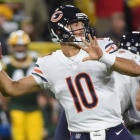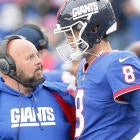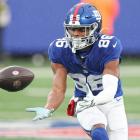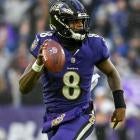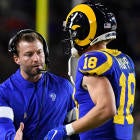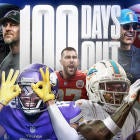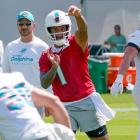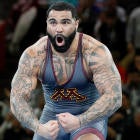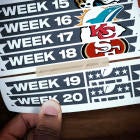On this week's edition of "Monday Night Football," we've got two teams looking to avoid an 0-2 start that would drop them far behind the leaders of their respective divisions. The Chicago Bears lost a heartbreaker to -- who else -- Aaron Rodgers and the Packers in Week 1, while the Seattle Seahawks dropped a road game to the Broncos in Denver that saw many familiar issues crop up.
The Bears are a team thought to be on the rise, but that has not shown us all that much to indicate the rise is imminent just yet. The Seahawks, by contrast, are a team many think is due for a decline but that has so much institutional memory that it's hard to believe that fall will come fast. One of these teams is going to get knocked backward in a way we didn't necessarily anticipate at the start of the season, while the other can right the ship and potentially make a run toward the playoffs.
How will it all go down? Read on to find out.
When the Seahawks have the ball
Much like they did last year, the Seahawks will likely have to lean on Russell Wilson throughout this season to generate much of their offense. Hopefully, for their sake, they will not have to lean on him to quite the extent they did a year ago. Wilson accounted for over 86 percent of Seattle's total yards in 2017, and for 37 of the Seahawks' 38 offensive touchdowns as well. (He even led the team in rushing with more than twice as many yards as the next-closest player -- and that guy was Mike Davis, who played in only six games.)
Seattle again invested some more resources into the offensive line in hopes of keeping Wilson upright. He is the most-pressured quarterback in the league since he became the team's starter in 2012. D.J. Fluker was brought in to play guard. Ethan Pocic is now starting there as well. And last year's trade acquisition, Duane Brown, was given a long-term deal. This is still not exactly a stalwart offensive line that will give Wilson a ton of time in the pocket and prevent him from having to run for his life all the time (just watch the tape of last week's six-sack debacle against the Broncos), but at least they continue to try in that area.
For their part, the Bears got after the quarterback about as well as a team possibly can in the first half of last week's game. Khalil Mack pretty much single-handedly destroyed the Green Bay offense prior to halftime, and by the end of the night, the Bears had racked up four sacks, 10 hurries, nine hits, and three knockdowns. Sure, Aaron Rodgers ripped their hearts out, but that was at least a good sign for them going forward. Once Mack and rookie linebacker Roquan Smith get fully up to speed on the defense and in better condition, this team should be incredibly tough to score on.
If the Seahawks want to take the pressure off their franchise QB this week, they'll have to get more out of running back duo Chris Carson and Rashaad Penny. Carson, the former seventh-round pick, has looked like the more talented player throughout camp and preseason, and in Week 1 as well. Both runners played 25 offensive snaps in Week 1. Both were given seven carries and targeted five times in the passing game. But Carson gained 79 yards to Penny's 43. It's clear the team has plans for Penny after drafting him in the first round but it may be wise to ease him in as Carson handles more of the work, since it's pretty clear he is the more effective player at this point.
They may need both to play more sizable roles than last week, however, because the Seahawks will be without Wilson's top passing-game target. Doug Baldwin has already been ruled out for the contest, which leaves Tyler Lockett, Brandon Marshall, Jaron Brown, and tight end Will Dissly as his options on the outside. Considering the relative lack of success Wilson has had throwing to non-Baldwin options in his career, he could be in for a long night against a Bears defense that can both rush the passer and contain the perimeter with strong defensive backs.
| Receiver | Rec % | Yds/Rec | TD% |
| Baldwin | 69.2% | 9.07 | 6.8% |
| Not Baldwin | 62.6% | 7.54 | 5.5% |
Wilson spread the ball around last week, targeting Lockett, Dissly, Penny, Carson, and Marshall at least four times apiece. Look for him to spread the wealth again, as the Seahawks will have to go to a pass-catcher-by-committee system without Wilson's go-to guy on the field. It doesn't necessarily help that so many of these pieces are new to Seattle, so if he does lock in on someone, it figures to be Lockett, who at least has been with the team for a while and was signed to a long-term deal this offseason that leads one to believe they intend him to be a significant part of the offense not just this year, but over the next few.
When the Bears have the ball
It's on this side of the ball where the two teams have undergone the most changes.
Chicago is running a completely revamped offensive system under new head coach Matt Nagy -- if you see a bunch of motion and trickeration and jet sweeps and mismatches and get reminded of the 2017 Chiefs, well, that's because Nagy was their offensive coordinator, and he's spent his entire professional coaching career working for Andy Reid. Most of the infrastructure surrounding second-year quarterback Mitchell Trubisky, like the system, is brand new as well: the Bears signed Allen Robinson, Taylor Gabriel, and Trey Burton for a combined $100 million this offseason, and then they drafted Anthony Miller in the second round.
All that change worked out well for the Bears at the beginning of last week's season-opening loss to the division rival Packers, but after a while they struggled to sustain a rhythm offensively. Trubisky eschewed the aggressiveness with which he opened the game, pulling the ball down to run far too often and refusing to take any chances down the field whatsoever. He checked down often to Jordan Howard and Tarik Cohen. He failed to connect with Burton, who had been pumped up as a key acquisition. (More on him later.) By the end of the night, he averaged 1.46 air yards per attempt when unpressured, 35th out of the 36 quarterbacks that threw at least five passes in their team's opener. The only player behind him was Nathan Peterman.
That was the continuation of a career-long trend for Trubisky, who was near the bottom of pretty much every yardage ranking among quarterbacks during his rookie season. He averages just 6.5 yards per attempt for his career, with eight games above 7.0 per attempt and five below that mark -- one of which involved him throwing only seven passes. It's somewhat surprising the Chicago passing game could not get more going given the success Jordan Howard had running the ball (15 carries, 82 yards; 3.9 yards after contact per carry), but as Nagy said during the week, it's important to remember that both he and Trubisky are really doing this for the first time.
There was a lot of "this year's Rams" buzz around the Bears this offseason because of the similarities between them and the 2017 version of LA (second-year quarterback who struggled as a rookie, rookie head coach known for his work with QBs replacing one of the NFL's least creative coaches, a heavy influx of pass-catching talent to complement a stud running back), but not every team can hit the ground running with a 46-point opener like Sean McVay's crew did last year.
Of course, the Rams' shocking run last year was so shocking in the first place because it resulted in the Seahawks being knocked off their perch as NFC West champions. Seattle had won the division every season since 2012 and become a staple in the later rounds of the playoffs, as Wilson and the defense kept them in every game -- literally -- for years. In 2017 that defense finally fell off a bit, and now, it looks much different than it ever has before.
The Seahawks lost players this offseason who accounted for 39.3 percent of their defensive snaps a year ago, but that number under-sells just how much turnover there has really been because so many longtime stalwarts missed time last year and then left the team. Richard Sherman tore his Achilles, and signed with the 49ers. Kam Chancellor suffered a neck injury, then was forced to retire. The same is true of Cliff Avril. But they're not the only players who are gone. Michael Bennett was traded to the Eagles. Sheldon Richardson signed with the Vikings. Jeremy Lane and Byron Maxwell were released.
Even some of the holdovers that give this unit what little continuity it has will not actually be on the field for this particular game. Linebackers Bobby Wagner and K.J. Wright have been ruled out, and that leaves a big hole in the middle of the Seattle defense -- particularly against the pass. Wagner and Wright are two of the best coverage linebackers in the NFL, and without them players like Burton and Tarik Cohen could have opportunities to get into open space. Burton caught just one of his six targets last week and Cohen gained only 16 yards on his three grabs. Working against backup linebackers could be just what they need to find a rhythm with Trubisky.
Pick: Bears 20, Seahawks 17













